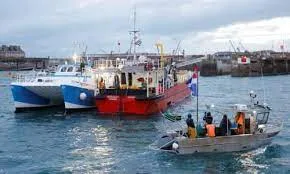Paris plans to sue London to extract more licenses for its fishermen
The French government intends to ask the European Commission to launch a legal action against the United Kingdom to seek more licenses for its fishermen, and at the same time it is determined to launch a scheme to compensate those prohibited from fishing.
The government's decision came after a meeting Friday at the Elysee between French President Emmanuel Macron and a delegation representing fishermen and officials of the relevant regions, 11 months after a sharp British-French dispute over the granting of post-Brexit fishing licenses.
After the meeting, Minister of State for European Affairs Clement Bonn said, "In the coming days, we will ask the European Commission to launch a judicial procedure for the licenses that are our right," stressing the "priority" and "importance" of this matter.
Paris will also ask Brussels "to hold a meeting of the Association Council, which the Brexit agreement stipulated to rely on when a problem arises, and it is a political body that has not held any meeting yet, in order to make it clear to the British that the problem is European and that they do not fully respect the agreement," according to Bonn.
Under the agreement signed at the end of the year 2020 between London and Brussels, European fishermen have the right to continue their work in British waters, provided they prove that they were previously fishing there. But for more than 11 months, the French and British have been wrangling over the nature of the proof to be provided.
With the exception of the Mediterranean, British waters provide French fishermen with about 20% of their fish resources.
And the Minister of the Seas, Annick Girardin, indicated that her country is still waiting for 73 additional licenses, pledging to continue dialogue with London and the English islands in the Normandy region to "extract" the remaining licenses.
The two ministers discussed the possibility of compensating fishermen who would not obtain licenses.
Gyaradane said the president wanted the fishermen's compensation plan to be "clear" and "tailored" and "case-by-case".
In light of expectations of an Omicron outbreak, Germany imposes a quarantine on arrivals from France
Prime Minister Jan Casteks says that Omicron will "spread so fast that it will become prevalent from early 2022. Germany, France and Denmark classify as "high risk" regions, which means imposing a quarantine on unvaccinated arrivals.
On Friday, French Prime Minister Jean Castix compared the spread of Omicron in Europe to "lightning", stressing that it will become the dominant mutation in France as of early 2022.
Castex said that while many details are not yet known about Omicron, it "does not appear to be more dangerous than the Delta mutant, and the data available to us suggest that full vaccination coverage with a booster dose protects well against severe forms of the disease."
On the other hand, Germany on Friday classified France and Denmark as “high risk” areas, which means imposing a quarantine on unvaccinated arrivals from the two countries, according to what the institution in charge of health monitoring announced.
The measure will be applied from Sunday, and it also includes arrivals from Norway, Lebanon and Andorra, and means that travelers who have not completed the vaccination or who have not previously been infected and recovered from Corona should self-quarantine, with the possibility of being tested on the fifth day after their arrival.
Health Minister Karl Lauterbach said earlier that Germany, which is witnessing a rise in the number of HIV infections, must prepare for a new "massive wave" linked to the outbreak of the mutant Omicron.
For its part, Denmark announced on Friday the ban on a wide range of cultural activities and the imposition of new restrictions on nightlife, in an attempt to limit the record rise in the number of HIV infections.
On Friday, Denmark recorded a record daily infection toll of more than 11,000


good
ReplyDeleteAn impressive read
ReplyDelete